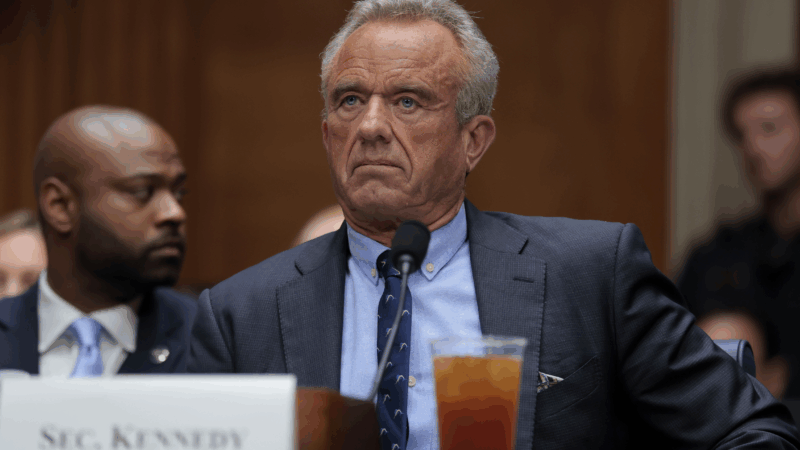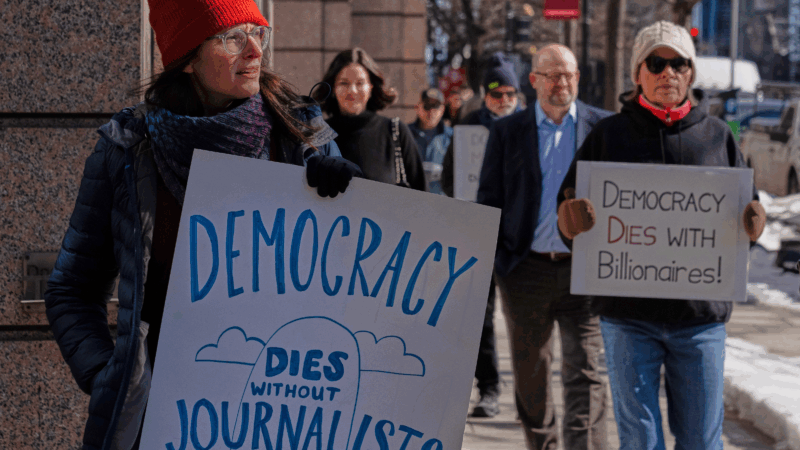RFK Jr. stands by deep cuts to health budget during contentious hearings
Health Secretary Robert F. Kennedy Jr. says that Elon Musk’s DOGE effort drew up the blueprint for spending cuts that are reshaping the Department of Health and Human Services — and Kennedy and his team implemented them. Kennedy also said he pushed back on some cuts and has reinstated a few programs cut mistakenly.
Kennedy faced hours of questioning Wednesday in two congressional committee hearings — one in the House Appropriations Committee and one in the Senate HELP (Health, Education, Labor and Pensions) Committee.
The official topic was President Trump’s budget for fiscal year 2026, but many other issues came up including the autism research Kennedy has launched, the measles outbreak in west Texas and the massive overhaul of HHS, where 20,000 employees have been fired or taken a buyout or early retirement.
In general, Kennedy stood behind the huge sweeping changes to his agency — though he has backtracked slightly on a case-by-case basis. Otherwise, he is staying the course with Trump’s plans to cut billions more from the HHS budget, which Kennedy acknowledged will be “painful.”
Congressional authority discussed
In an exchange with Rep. Rosa DeLauro, D-Conn., the ranking member on the House Appropriations Committee, Kennedy said, “You have the power of the purse,” referring to the House of Representatives. DeLauro responded, “Thank you!” and went on to say that Kennedy and the Trump administration are illegally impounding funds appropriated by congress this year. “You don’t have the authority,” she said.
Questions from Republicans on the panels had a gentler tone, but even the chair of the Senate HELP committee Sen. Bill Cassidy, R.-La., urged Kennedy to work with congress more.
“The Department needs to have an effective plan to fulfill statutory duties in tandem with its efforts to increase transparency and accountability, streamline programs, and root out wasteful spending,” Cassidy, who is also a physician, said in his opening statement. “Congress and the administration should work together to ensure reforms strike the right balance and deliver for the American people.”
Protestors interrupted the beginning of the Senate hearing yelling, “RFK kills people with AIDS.” They were quickly removed by police officers and the hearing continued.
Fuzzy details
The comments about Musk came in an exchange with Rep. Steny Hoyer, D.-Md., in the House hearing. “Who made those decisions? You or Musk?” Hoyer asked. Kennedy said that he worked with Musk’s team but had an ability to override things. He mentioned preventing the Head Start early education program from being cut, for example.
At times, Kennedy seemed fuzzy on the specifics of what actually was cut as lawmakers asked him about details like delays in payments to community groups and problems with clinical trials. He said he would look into things and get back to lawmakers individually.
Senator Andy Kim, D-N.J., brought up the World Trade Center health program, where staff have been reinstated. “But why were they cut in the first place?” Kim asked.
Kennedy said the time it would have taken to prevent mistakes like this would have allowed inertia to set in and the agency would have remained too big and unable to help the American population to get healthier, which he says is his big goal.
Vaccines and an alligator metaphor
Vaccines came up most pointedly when Sen. Chris Murphy, D.-Conn., questioned Kennedy. Murphy said Kennedy was undermining public trust in vaccines, by not strongly saying they are safe. Kennedy responded: “Senator, if I advise you to swim in a lake that I know there to be alligators in, wouldn’t you want me to tell you there were alligators in it?”

Cassidy, the doctor who chairs the Senate HELP committee, returned to the hearing room to correct Kennedy. “The Secretary made the statement that no vaccines except for COVID have been evaluated against placebo. For the record, that’s not true. The rotavirus, measles, and HPV vaccines have been, and some vaccines are tested against previous versions. So just for the record, to set that straight.”
In an earlier exchange with Rep. Mark Pocan, D.-Wisc., in the House hearing, Kennedy said he would “probably” vaccinate a small child against measles if he was the parent of a small child today. He didn’t answer about polio or chicken pox vaccines. He added, “I don’t think people should be taking medical advice from me.”
Kennedy also faced some questioning from Republicans in Oklahoma and Maine who were concerned about cuts to biomedical research in their districts.
DeLauro ended the House hearing noting that Republican members of congress have been able to work with Kennedy’s HHS to reinstate staffing of some programs required by law while Democrats’ letters and other communications have not gotten responses. “Who do Democrats have to call?” she said, before pointedly asking for reinstatement of a program for lead poisoning.
Pentagon says it’s cutting ties with ‘woke’ Harvard, ending military training
Amid an ongoing standoff between Harvard and the White House, the Defense Department said it plans to cut ties with the Ivy League — ending military training, fellowships and certificate programs.
‘Washington Post’ CEO resigns after going AWOL during massive job cuts
Washington Post chief executive and publisher Will Lewis has resigned just days after the newspaper announced massive layoffs.
In this Icelandic drama, a couple quietly drifts apart
Icelandic director Hlynur Pálmason weaves scenes of quiet domestic life against the backdrop of an arresting landscape in his newest film.
After the Fall: How Olympic figure skaters soar after stumbling on the ice
Olympic figure skating is often seems to take athletes to the very edge of perfection, but even the greatest stumble and fall. How do they pull themselves together again on the biggest world stage? Toughness, poise and practice.
They’re cured of leprosy. Why do they still live in leprosy colonies?
Leprosy is one of the least contagious diseases around — and perhaps one of the most misunderstood. The colonies are relics of a not-too-distant past when those diagnosed with leprosy were exiled.
This season, ‘The Pitt’ is about what doesn’t happen in one day
The first season of The Pitt was about acute problems. The second is about chronic ones.







